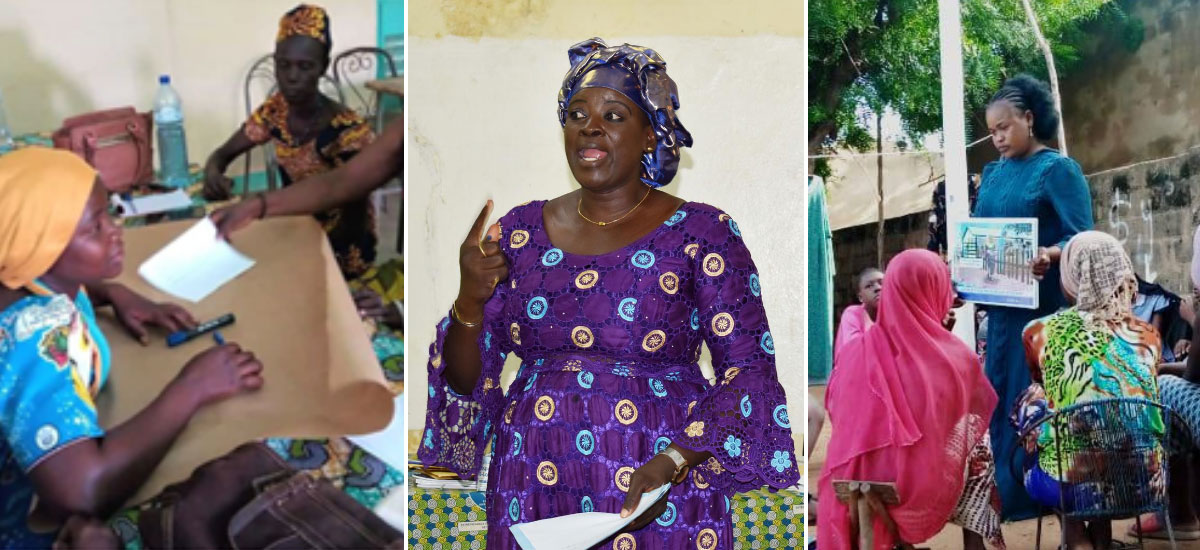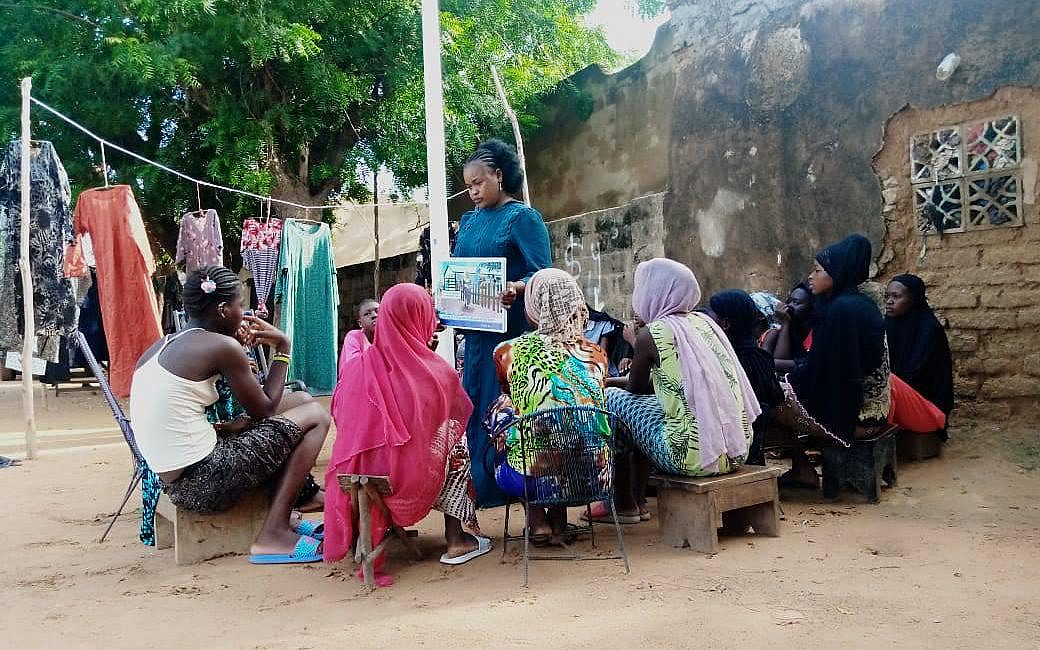Strengthening the role of women in development in the Sahel: 3 examples
In the Sahel, women are making a strong contribution tackle the region’s challenges. Women are agents of change in all areas – economic life, social cohesion, nutritional security, climate resilience – but they face many obstacles to their empowerment and participation. To support their role, the members of the Sahel Alliance have decided to integrate gender across all projects. Through 3 very different examples, discover how these actions are changing the lives of Sahelian women.
Contents
- Amplifying women’s voice and leadership (Mali and Burkina Faso)
- Promoting women’s participation in politics (Burkina Faso)
- Engaging young leaders to address sexual and reproductive health challenges (Mali)
- Concerted approach of the Sahel Alliance to support women’s voices

Amplifying women’s voice and leadership (Mali and Burkina Faso)
Although gender equality is legally recognised in Mali and Burkina Faso, in reality, social norms and institutional practices which discriminate against women persist, particularly in terms of access to education, health care, economic opportunities and political participation.
The Women’s Voice and Leadership (WVL) project was launched to revive and amplify the work of local women’s rights organisations and feminist organisations in both countries.
Our NGO was not active anymore. With the WVL project, we were able to resume our activities, not only in our former areas of intervention, but also in other areas that we had not yet reached,” says the president of the FID partner organisation in Mali.
The activities carried out under this programme have helped to deconstruct misconceptions and to reduce taboos.
The Malian organisation AMAFH, which targets women living with disabilities, says: “Thanks to the multi-year, rapid and responsive funding, our NGO has been able to reach all the circles of the Kayes region through theatrical tours. These activities have made it possible to change people’s attitudes towards people with disabilities, especially women and girls, in the areas visited.”
The support offered by WVL enables organisations to push their limits. “We have been able to carry out activities in several places, such as the communes of Bamako and in the Kayes region. This is the first time we have been able to carry out activities on this scale!” says the young women’s organisation, RENADJEF.
In Burkina Faso, the participation of men in discussion groups on violence against women has led to a change in their behaviour towards their wives.
Rakieta Nikiema, born Compaoré, testifies on the impact of these actions on her personal life: “The exchanges between me and my husband have changed a lot. He no longer dictates things to me. For example, he no longer imposes his choice of meals on me, we discuss the children’s schooling and, above all, he accepts that I take part in meetings when previously this was not possible. These talks with men allow a change of mentality. They see us women as actors who can bring positive change to the family.“
Funded by Canada ($4.2 million in Burkina Faso, $8 million in Mali), the project is being implemented in Mali by the consortium formed by the Centre for International Studies and Cooperation (Centre d’études et de coopération internationale – CECI) and the Société de coopération pour le développement international (SOCODEVI). In Burkina Faso, the project is implemented by the NGO Oxfam-Québec. Read more about the progress of the Women’s Voice and Leadership programme in Mali and in Burkina Faso.
Promoting women’s political participation (Burkina Faso)
In Burkina Faso, there are many inequalities between women and men when exercising political rights: few women are interested in local or national politics, few vote, few stand as candidates, few are elected.
There are many reasons for this: self-censorship by women who do not consider themselves legitimate to vote or stand for election, socio-cultural constraints that stigmatise women involved in the public sphere, and the refusal of political parties to pass a binding law on quotas in the national assembly.
To help reduce gender inequalities in exercising of political rights, the “Femmes ! Levez-vous ! ” (“Women! Rise Up!”) project aims to promote women’s leadership and participation in politics in Burkina Faso.
The political context of the country – cancellation of the municipal elections scheduled for 2021, dissolution of the legislative assembly in 2022, etc. – penalises the implementation of women’s effective participation in public life. Nevertheless, a number of levers have enabled progress to be made.
The “Femmes ! Levez-vous !” project has, among other things, enabled:
- building women’s self-confidence to engage in public debate;
- preparing civil society figures for future elections after the end of the project;
- raising awareness among boys and men to recognise women’s place in the public sphere and to encourage their participation as candidates in elections.
The Signorta organisation (“Signorta” means “Let’s unite”) was created in 2018 and has now almost 90 members. Supported by the “Femmes ! Levez-vous !” project, the organisation has been able to intensify its actions to promote women, through theatre, educational talks, women’s training (in leadership and in women’s rights), radio programmes, etc.
Its president, Mrs. Nifabaséota Dabire, says: “Thanks to these activities, we have succeeded in instiling in these women a clear desire to make a real commitment to their own development. We recognise the need for this project in the South-West region where women’s participation in local governance is still low, not to mention the socio-cultural constraints that do not give women a prominent place in local development. This project has had a positive impact on the vision of the women of the commune”.
Executive director of the citizen movement Femin in’, Bénédicte Bailou was appointed to the Transitional Legislative Assembly (ALT) by members of the civil society. Her testimony highlights how far she has come since she met the “Femmes ! Levez-vous !” project and her participation in training courses on different themes.
Co-financed by the European Union (300.000 €) and the PMLAL (15.790 €), the « Femmes ! Levez-vous ! » project is implemented by Progetto Mondo, Réseau Afrique Jeunesse, Association des Femmes Juristes du Burkina Faso and AIDOS.
Engaging young leaders to address sexual and reproductive health challenges (Mali)
As elsewhere in the Sahel, adolescent girls and young people in Mali face many challenges in relation to reproductive health and sexual rights. In response, two organisations have joined forces (CAEB and CORDAID) to implement the JLSRAJ/JIGIYA project, with financial support from the Netherlands. The aim is to contribute to the improvement of sexual and reproductive health indicators among young people, through better information and greater freedom to make choices.
8 national NGOs implement activities in the regions of Mopti, Ségou, Kayes and Koulikoro, in 84 communes and over 700 villages. Information and awareness-raising activities address issues such as: family planning, sexually transmitted infections, unwanted and early pregnancies, sexual violence, drug use, etc. The approach is based on “doing”, with young people taking an active and decisive part in the various activities.

By September 2022, the programme had achieved the following results:
- 1,440 groups of more than 32,000 adolescent girls and young people (more than 65% of whom are girls) have been created.
- More than 3,800 young leaders (nearly 60% of whom are girls) are conducting information sessions with their peers on various topics related to sexual and reproductive health.
- 14 young champions (including 4 girls) advocate with communal authorities and community and religious leaders for ending harmful traditional practices (such as female genital mutilation) in their communities.
- 32 young radio speakers (50% of whom are girls) produce programmes on topics related to sexual and reproductive health.
- 203 communities signed conventions to end female genital mutilation and child marriage.
The young people in the programme use social media (YouTube, Facebook, Twitter) to give access to information to as many people as possible.
Funded by the Kingdom of the Netherlands with €14.5 million over 7 years, the project is implemented by CAEB and CORDAID.
Concerted approach of the Sahel Alliance to support women’s voices
The gender approach of the Sahel Alliance members has been developed in partnership with the G5 Sahel Women’s Platform to ensure that women and girls in the G5 Sahel countries live a life where their human rights are respected and where they fully participate in the formulation and implementation of policies to achieve the empowerment of women and girls.
Among all the projects with the Alliance Sahel label, over 600 have a main or significant “gender” objective, which represents more than 50% of all the projects in the Alliance’s portfolio and illustrates the importance of the theme for the members.
Go further

